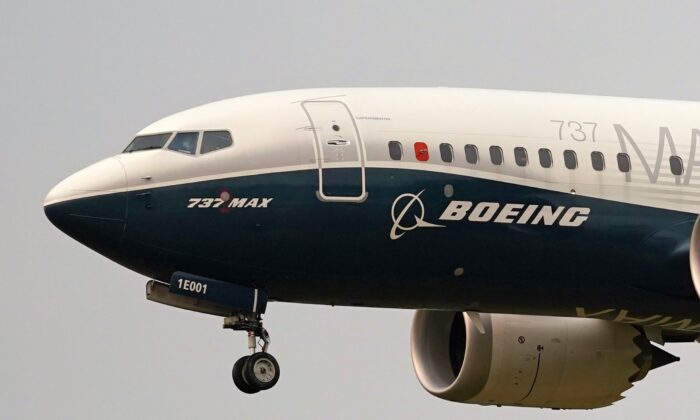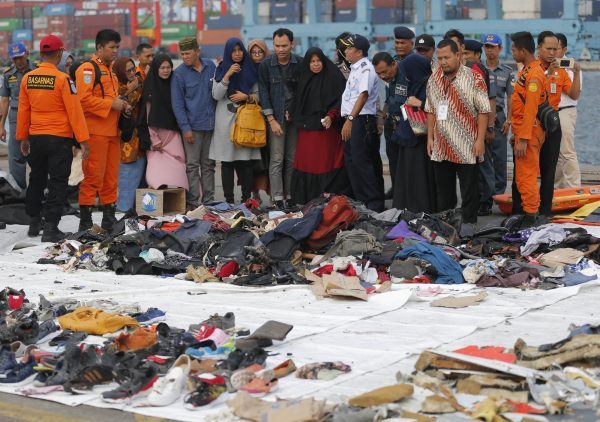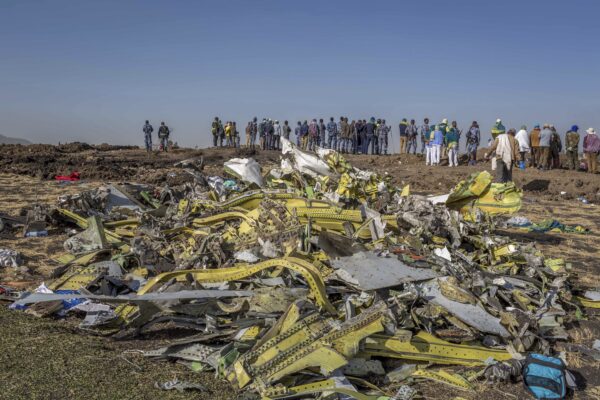
U.S.-based aircraft maker Boeing pleaded not guilty in court on Jan. 26 to a fraud conspiracy felony charge after it was accused of deceiving regulators about flight control systems on its 737 MAX aircraft, which was involved in two crashes.
U.S. District Judge Reed O’Connor took the plea from Boeing, which was represented by its chief safety officer and a string of lawyers, during the three-hour hearing in Fort Worth, Texas.
Family members of those who died in the crashes read emotional testimony as they called for top Boeing officials to face criminal charges and rejected a 2021 Department of Justice agreement to resolve the investigations into the crashes.
O’Connor ordered the company not to break any laws for the next year.
The aerospace giant has been accused by prosecutors of concealing information about flight control systems, specifically the Maneuvering Characteristics Augmentation System (MCAS), that caused the plane crashes in 2018 and 2019.
MCAS provides consistent airplane handling characteristics in a very specific set of unusual flight conditions, such as when the pilot is flying the plane manually, when the plane’s nose approaches a higher-than-usual angle, or when the plane’s wing flaps are up, according to Boeing.
The Federal Aviation Administration’s Aircraft Evaluation Group (FAA AEG) began reviewing and evaluating MCAS after a Boeing 737 MAX operated by Indonesian airline Lion Air crashed in 2018, killing all 189 people on board.
 Relatives of passengers of a crashed Lion Air jet check personal belongings retrieved from the waters where the airplane is believed to have crashed, at Tanjung Priok Port in Jakarta, Indonesia, on Oct. 31, 2018. (Tatan Syuflana/AP)Victim’s Families Call for Justice
Relatives of passengers of a crashed Lion Air jet check personal belongings retrieved from the waters where the airplane is believed to have crashed, at Tanjung Priok Port in Jakarta, Indonesia, on Oct. 31, 2018. (Tatan Syuflana/AP)Victim’s Families Call for Justice
That evaluation found that MCAS was operating on the flight in the moments before it crashed, and the FAA AEG subsequently found that important information about the augmentation system had been withheld from federal safety regulators.
A second 737 MAX aircraft, operated by Ethiopian Airlines, crashed in 2019 shortly after takeoff, killing all 157 people onboard. MCAS was also operating on that plane in the moments before the crash, according to the FAA.
All 737 MAX airplanes were grounded in the United States shortly after and Boeing eventually overhauled the system.
However, the company avoided a trial over the crashes following secret negotiations with the DOJ which allowed it to avoid being charged with defrauding the United States by deceiving regulators who approved the plane.
Instead, it agreed in 2021 to pay $2.5 billion, made up of a $243.6 million fine, a $500 million fund for victim compensation, and nearly $1.8 billion to airlines whose MAX jets were grounded.
Boeing placed most of the blame for the incidents on Mark Forkner, who previously served as chief technical pilot for Boeing. Forkner was indicted for fraud for deceiving and withholding “critical information” from the FAA AEG in October 2021 but was acquitted at a trial last year.
However, relatives of those who died in the crashes have asked that settlement to be thrown out, stating that they were not informed about the secret negotiations. O’Connor last week ordered Boeing to be arraigned after he ruled that those who died in the two crashes are legally considered “crime victims.”
The DOJ has defended its settlement with Boeing, insisting it was appropriate while opposing reopening the agreement, as has Boeing.
But family members during Thursday’s hearing spoke of their loss while calling for justice.
“We want to see real justice, and that has to be prosecutions for manslaughter,” said Naoise Connolly Ryan, whose husband, Mick, was killed in the second crash.
 Wreckage is piled at the crash scene of Ethiopian Airlines flight ET302 near Bishoftu, Ethiopia, on March 11, 2019. (Mulugeta Ayene/AP Photo)Boeing Issues Statement, Says It’s Made Broad Changes
Wreckage is piled at the crash scene of Ethiopian Airlines flight ET302 near Bishoftu, Ethiopia, on March 11, 2019. (Mulugeta Ayene/AP Photo)Boeing Issues Statement, Says It’s Made Broad Changes
Naheed Noormohamed, who lost his father, Ameen, on the same flight, said the DOJ had failed the families by not considering their pain.
“This is not just a failure of justice, it’s a failure of humanity,” he testified.
O’Connor subsequently told Boeing that it must not commit any new crimes for the next year, but stopped short of ruling on other conditions that families of the victims had sought, including a request to appoint a special independent monitor to oversee Boeing’s compliance and examine safety issues at the company.
He also did not rule on their request that Boeing publicly discloses as much information as possible relating to its corporate compliance efforts that were adopted in 2021. The judge also did not make a ruling on another request from the families of the victims regarding the 2021 DOJ deal.
Families had asked that O’Connor throw out part of that deal that granted Boeing immunity from prosecution, which could possibly allow the DOJ to reverse the deal and prosecute the company.
In a statement, the plane maker said it has “made broad and deep changes across our company, and made changes to the design of the 737 MAX to ensure that accidents like these never happen again.”
“We also are committed to continuing to comply scrupulously with all of our obligations under the agreement we entered into with the Justice Department two years ago,” the company said.
The Epoch Times has contacted Boeing for comment.
Reuters and The Associated Press contributed to this report.